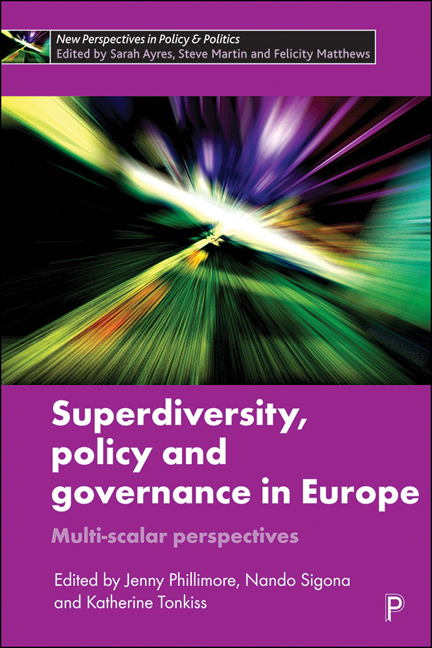Book contents
- Frontmatter
- Contents
- List of Figures and Tables
- Notes on Contributors
- Introduction: Superdiversity, Policy and Governance in Europe
- Chapter One Managing Superdiversity? Examining the Intercultural Policy Turn in Europe
- Chapter Two Mainstreaming in Response to Superdiversity? The Governance of Migration-Related Diversity in France, The UK and the Netherlands
- Chapter Three Making the Most of Superdiversity: Notes on the Potential of a New Approach
- Chapter Four Superdiversity and Sub-National Autonomous Regions: Perspectives from the South Tyrolean Case
- Chapter Five Transmigration: The Rise of Flexible Migration Strategies as Part of Superdiversity
- Chapter Six Superdiversity, Multiculturalism and Local Policies: A Study on European Cities
- Chapter Seven Integrating Superdiversity in Urban Governance: The Case of Inner-city Lisbon
- Chapter Eight Urban Planning and the Challenge of Superdiversity
- Chapter Nine Superdiversity in the Post-Industrial City: A Comparative Analysis of Backlash Narratives in Six European Neighbourhoods
- Index
Chapter Four - Superdiversity and Sub-National Autonomous Regions: Perspectives from the South Tyrolean Case
Published online by Cambridge University Press: 04 March 2021
- Frontmatter
- Contents
- List of Figures and Tables
- Notes on Contributors
- Introduction: Superdiversity, Policy and Governance in Europe
- Chapter One Managing Superdiversity? Examining the Intercultural Policy Turn in Europe
- Chapter Two Mainstreaming in Response to Superdiversity? The Governance of Migration-Related Diversity in France, The UK and the Netherlands
- Chapter Three Making the Most of Superdiversity: Notes on the Potential of a New Approach
- Chapter Four Superdiversity and Sub-National Autonomous Regions: Perspectives from the South Tyrolean Case
- Chapter Five Transmigration: The Rise of Flexible Migration Strategies as Part of Superdiversity
- Chapter Six Superdiversity, Multiculturalism and Local Policies: A Study on European Cities
- Chapter Seven Integrating Superdiversity in Urban Governance: The Case of Inner-city Lisbon
- Chapter Eight Urban Planning and the Challenge of Superdiversity
- Chapter Nine Superdiversity in the Post-Industrial City: A Comparative Analysis of Backlash Narratives in Six European Neighbourhoods
- Index
Summary
Introduction
For many sub-national autonomous regions of Western countries, such as Catalonia, South Tyrol, Scotland, Flanders, Basque Country and Quebec, where traditional-historical groups (‘old minorities’) live, migration is a stable and increasingly important reality. Some of these regions have attracted migrants for decades, while others have only recently experienced significant migration inflow.
The coexistence of old minorities and new minority groups originating from migration (‘new minorities’) in sub-national territories adds complexities to the management of diversity and migration issues. It is acknowledged that the relation between ‘old’ communities and ‘new’ minority groups can be rather complicated. Interests and needs of historical groups can be in contrast with those of the migrant population. Moreover, the presence of new minorities can have an impact, not necessarily a negative one, on the relationship between old minorities and majority groups at state level and also between old minorities and the central state, as well as with policies enacted to protect the diversity of traditional groups and the way old minorities understand and define themselves.
In the past, the subject of the relationship between old communities and new minorities has been largely neglected by scholars. With few exceptions (Medda-Windischer 2009), minority and multicultural issues have been studied separately from the point of view of historical groups or migrant communities, focusing on the relationship between each of these two categories and the dominant state, and highlighting differences between the claims of old minorities, who carry on nation-building projects, and migrant communities, who are expected to integrate into the dominant society (Kymlicka, 1995).
When these two perspectives have been combined, it has often been to sustain the so-called ‘threat hypothesis’, namely the belief that historical groups frequently perceive large-scale migration as a danger and harbour defensive and exclusionary attitudes towards migrants due to their ethnocentric understanding of identities or due to the fear that migrants will eventually integrate into the central state culture, further outnumbering the old minorities (Kymlicka, 2001, 278–9; Jeram and Adam, 2013, 2).
In the last decade, scholars have started to look more deeply into the relationship between old and new minorities (Medda-Windischer, 2010). The ‘threat hypothesis’ has been opposed, since various ethno-national groups actually manifest inclusive approaches to migration.
- Type
- Chapter
- Information
- Superdiversity, Policy and Governance in EuropeMulti-scalar Perspectives, pp. 75 - 99Publisher: Bristol University PressPrint publication year: 2020



